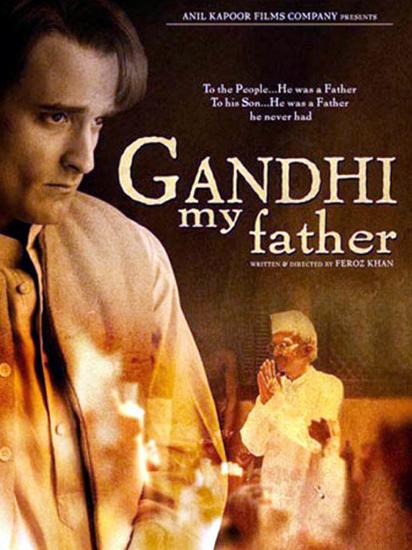
 |
 Much has been speculated about Gandhiâs personal life, and his tumultuous relationship with his son Harilal. I am actually amazed (and quite pleased) that someone in Bollywood would take up such a subject, because frankly we âdesisâ tend to revere our Mahatmas, and refuse to listen to any criticism of them. Thus although the film lauds Gandhiâs role in the freedom struggle, he doesnât come out quite as clean in his personal relationships. Much has been speculated about Gandhiâs personal life, and his tumultuous relationship with his son Harilal. I am actually amazed (and quite pleased) that someone in Bollywood would take up such a subject, because frankly we âdesisâ tend to revere our Mahatmas, and refuse to listen to any criticism of them. Thus although the film lauds Gandhiâs role in the freedom struggle, he doesnât come out quite as clean in his personal relationships.
The film is sort of biographical in nature, since it starts when we see a bedraggled Harilal Gandhi (the eldest of his sons) brought to a hospital in a semi-conscious state. Taken for a beggar with his matted locks and unkempt state, his assertion that he is Mohandas Karamchand Gandhiâs son is taken with a grain of salt. The film traces back Harilalâs life from his youth up till the present day, and in the process we see Gandhiâs family life, the roots of his activism, and his personal beliefs as they affected Harilal and the rest of the family. When the film starts off, Gandhi (Darshan Jariwala) is a young barrister in South Africa, living there with Kasturba (Shefali Shah) and four of his children. His eldest son Harilal (Akshaye Khanna) is in India, planning to marry his fiancĂ©e Gulab (Bhumika Chawla). Gandhi, upset at the early date of the union (he himself has gotten Harilal engaged four years ago), resolves to cut himself off from him. He softens later on when Harilal comes to South Africa to assist him, but still wants him to remain entrenched in grass-roots activism instead of going on to London for further education â something which the son dearly desires. The film later dwells upon the (almost philosophical) rift between Gandhi and Harilal, the latterâs attempts to do his own thing, achieve his independence, and break away from his fatherâs name and influence. And what an influence! Gandhi is the beacon of light; the others are merely fire-flies fluttering around blinded. Seen as a frail man, Gandhi appears to be civility personified. However in his personal relationships, polite and soft-spoken as ever, he is a stern and harsh task-master. As seen in the film, his family lives by his ideals; whether they like it or not. Fair to a fault, Gandhi treats all as equal: his family members or outsiders, and this leads to ruffled feelings. Understandably Kasturba who witnesses Gandhiâs behavior towards her children, is torn between her loyalty towards her husband, and compassion for her kids. Harilal, the only child to express his displeasure verbally and rebel, finally breaks away completely.
Although Harilalâs character as portrayed in the film, is essentially that of a weak man, his desire to better himself whichever way, is nothing if not redeeming. He is the dutiful son, loving, devoted, but still rebelling against the notion that his life is pre-ordained, that everyone but him knows whatâs best for him. How else to explain Gulab packing him away to South Africa, telling him that âBapuâ needs him? How else to explain when Gulab is sent back from South Africa because âsomeoneâ decides that her presence is distracting Harilal from achieving his objectives? When Harilal - attempting to escape South Africa incognito- is recognized and sent back to Gandhi, he talks frankly to his father of his desire to make his own destiny. Says Gandhi, âAnd what if you canât ?â. So beautifully is Harilalâs angst sketched that one wonders if Harilal even had a chance with a parent who doubted him at every step. This filmâs strength is in its actors, and the sensitivity and compassion that is brought into its portrayals, beautifully expressing their dilemmas and constraints. The direction is good and the dialogues pass muster. What I thought didnât work too well, was the attempt to intersperse the flashback with the current, since it didnât enhance the narration any. Not your masala entertainer, this film still turned out to be an interesting watch, a close-up look at a great leaderâs tenuous links with family, from a different point of view. This film might be the lone dissenting voice, amid the crowd of Gandhi devotees, but it presents its case well, humanely and with due compassion.
|
| Comments | Contact Us | Advertise | Terms of Service | Privacy Policy |